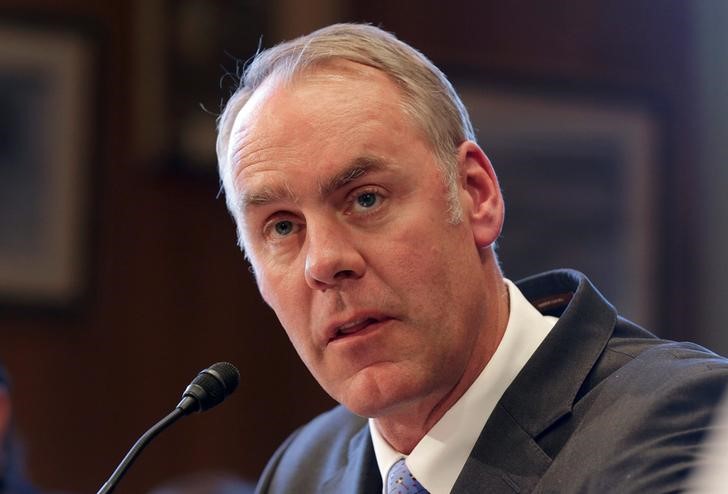By Valerie Volcovici
WASHINGTON (Reuters) - The U.S. Interior Department said on Wednesday that it would form a new committee to review royalty rates collected from oil and gas drilling, coal mining and renewable energy production on federal lands to ensure taxpayers receive their full value.
Interior Secretary Ryan Zinke said the committee would advise him on whether the government is getting a fair price from companies that lease public land for energy and natural resource development.
The committee will replace the process put in place by former Interior Secretary Sally Jewell to review and overhaul the federal coal leasing program.
"The programmatic review put in place (by Jewell) was costly and unnecessary," Zinke told reporters on Wednesday.
"I have established a royalty policy committee to provide advice to me about how we value collections across the board," he said.
In January 2016, the administration of former Democratic President Barack Obama began a multiyear review of the federal coal leasing program after government and watchdog reports found Interior's Bureau of Land Management was not properly accounting for the fair market value of coal.
It also ordered a moratorium on new coal leases for at least three years during the review, which Republican President Donald Trump officially rescinded in the executive order on energy he signed Tuesday.
Zinke's committee will instead get recommendations on adjusting royalty rates for coal, as well as oil and gas, from a panel of up to 28 members.
Members will include Interior Department officials, representatives of western states and Indian tribes that produce energy, energy stakeholders and academic groups who will serve three-year terms.
Federal coal, primarily from Wyoming's Powder River Basin, accounts for more than 40 percent of all of that fuel mined in the United States and produces for 10 percent of U.S. greenhouse gas emissions.
Zinke's predecessor Jewell said a review of the program was three decades overdue and necessary after reports called for more transparency in the leasing process.
Environmental groups raised concerns that replacing the more comprehensive review with a committee approach will mean that other core problems with federal energy leasing will not be addressed, such as transparency and boosting competition in lease sales.
“Cancelling the coal program review is a serious mistake that only harms American taxpayers, coal states and communities," said Dan Bucks, former director of revenue for the state of Montana.
